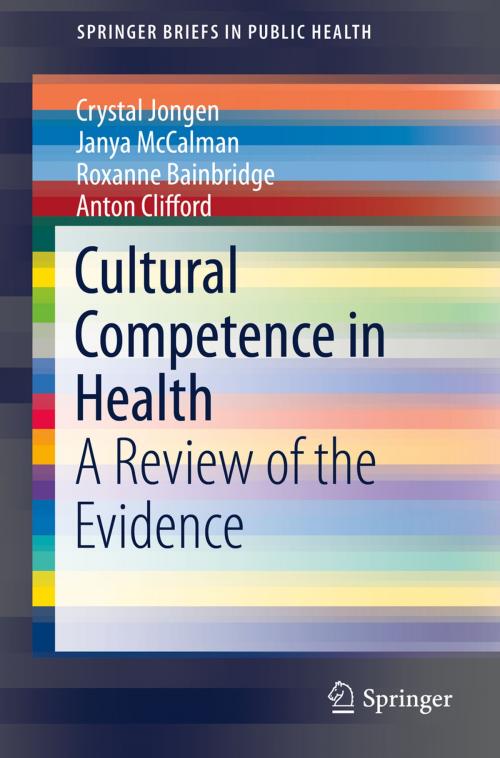Cultural Competence in Health
A Review of the Evidence
Nonfiction, Health & Well Being, Medical, Reference, Public Health, Social & Cultural Studies, Social Science, Sociology| Author: | Crystal Jongen, Anton Clifford, Roxanne Bainbridge, Janya McCalman | ISBN: | 9789811052934 |
| Publisher: | Springer Singapore | Publication: | October 13, 2017 |
| Imprint: | Springer | Language: | English |
| Author: | Crystal Jongen, Anton Clifford, Roxanne Bainbridge, Janya McCalman |
| ISBN: | 9789811052934 |
| Publisher: | Springer Singapore |
| Publication: | October 13, 2017 |
| Imprint: | Springer |
| Language: | English |
This resource supports evidence-informed approaches to improving the cultural competence of health service delivery. By reviewing the evidence from Australia, Canada, New Zealand and the US, it provides readers with a clear and systematic overview of the interventions and indicators applied to enable health system agencies and professionals to work effectively in various cross-cultural health care situations. The book highlights the importance of cultural competence and describes the current situation in the studied countries; identifies effective approaches and strategies for improving the situation; reviews the indicators for measuring progress; assesses the health outcomes associated with cultural competence; summarizes the quality of the evidence; and presents an evidence-informed conceptual framework for cultural competence in health. Cultural competence is critical to reducing health disparities and has become a popular concept in these countries for improving access to high-quality, respectful and responsive health care. This book provides policy makers, health practitioners, researchers and students with a much needed summary of what works to improve health systems, services and practice.
This resource supports evidence-informed approaches to improving the cultural competence of health service delivery. By reviewing the evidence from Australia, Canada, New Zealand and the US, it provides readers with a clear and systematic overview of the interventions and indicators applied to enable health system agencies and professionals to work effectively in various cross-cultural health care situations. The book highlights the importance of cultural competence and describes the current situation in the studied countries; identifies effective approaches and strategies for improving the situation; reviews the indicators for measuring progress; assesses the health outcomes associated with cultural competence; summarizes the quality of the evidence; and presents an evidence-informed conceptual framework for cultural competence in health. Cultural competence is critical to reducing health disparities and has become a popular concept in these countries for improving access to high-quality, respectful and responsive health care. This book provides policy makers, health practitioners, researchers and students with a much needed summary of what works to improve health systems, services and practice.















